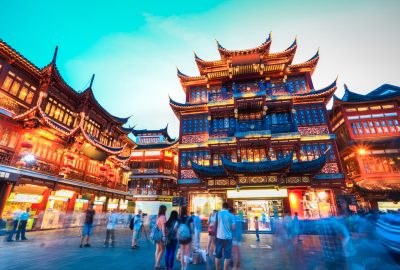Shanghai is one of the most interesting cities on earth. I had this image in my mind that China, being a socialist country, would be a proper dump. I couldn’t have been more wrong. The Chinese metropolis is running laps around the rest of the world in terms of development. People say they advance ten years in the span of one. It’s an exaggeration but not by a lot. You can literally take a magnetic hover train from the airport to the city. It only takes a few minutes running at 300 km/h. It’s Star Wars stuff. Shanghai is located at the Yangtze River Delta and is the largest shipping container port in the world. I have a fling for shipping containers; people build incredible houses out of those. Just to put things into perspective: over 26 million people live in Shanghai. Just imagine: that’s more than the entire population of Australia. They don’t mess around when they say it’s the #1 city in terms of population. It was already huge even before the 19th-century opium era. People couldn’t pass on the trade potential of this kind of territory. A few minor bumps on Shanghai’s road to greatness were unavoidable. A war here and there, an occasional embargo, and a dash of communism: stuff like that. And then there were of course the concessions, which is a fancy word for becoming a colony. In Shanghai’s case, the English and the French had their way with the city for a while. The real economic boom started when the Chinese opened up to foreign markets and investors in 1990. Electronics, counterfeit clothing, trade, infamous child labour; all feeds this economic machine that isn’t slowing down. Imagine the regime of living in a metropolis without Facebook and Instagram. That’s Shanghai.

Yu Garden and Yuyuan Bazaar: with their magnificent ancient achitecture and lively markets the tourist staples of Shanghai
I think this race to greatness is the main cause why Shanghai feels a bit off. They say it’s the gateway to China, where east meets west. I believe there’s a touch too much west in their east. There’s still the ancient Chinese stuff, like from a Miyazaki movie. But I wish there was more. You need to see the Yu Gardens. I’m not sure why it’s called a garden. It’s more of a tiny district within Shanghai and it is basically, Shanghai Old Town. It took 20 years to build and is over 400 years old. There are beautiful palaces built around streams, small temples, and charming pagodas. It’s lovely. Visit it in the morning and you’ll see old folks doing their Tai Chi routine. There’s a reason why they all live for so long. Shanghai is home to one of the most unnerving and architecturally unique buildings I’ve ever seen. I am talking about the Slaughterhouse complex built in 1933 and which goes under the name Old Millfun or just 1933. It reminds me of the Arkham Asylum from Batman. It was the largest abattoir in China and even Asia back in the days but now it serves as a mall/community centre. It’s so bizarre and convoluted that I wonder how it even served its original purpose. It’s grey and ugly but at the same time strangely hypnotic, almost “Lovecraftian”. Buying sneakers or having a Starbucks coffee and a muffin at the site of the death of thousands of animals is messed up. It is an unforgettable experience.
Shanghai can be expensive but only if you visit the spots tailored towards the western clientele. A beer at a place for expats costs up to $10 while the same exact beer at a bar for locals is less than $1. That’s quite a spread. Westerners tend to complain about Shanghai’s breakfast street food for the masses. It’s not super tasty and a bit bland. But it’s nutritious and keeping people functional for a long day of work is its original purpose. They serve noodles, buns, dumplings and a variety of crepes: all simple food. Most of the stuff you see in Chinese restaurants in Europe was not meant for the working class but traditionally dishes for wealthy merchants and royalty. Thankfully, you don’t need to look far for delicious meals customized towards foreigners. The variety and richness of the food scene in Shanghai is beyond imagination. The go-to spot for authentic Chinese cuisine would be the Old Jesse at 41 Tianping Rd. it’s cramped and doesn’t look like anything special. But hey, it’s mentioned in the Michelin guide, so you know it’s good stuff. They turn pork dishes into an art form.
I said that Shanghai got westernized a bit too much and I was not kidding. You can find burger and taco joints around every corner, Cuban restaurants and such. Hit Austin Hu’s Diner if you’re longing for familiar tastes. The guy is somewhat of a genius mixing Chinese, Japanese recipes into smashed burgers and fries. Good stuff. There are so many unique nightlife spots in Shanghai. Found 158, for example, is sort of an underground square filled with bars and restaurants. Both tourists and locals love this place for its variety of restaurants and bars like Blackstone (https://www.blackstonemagicbar.com/) where you can take part in magic tricks while getting smashed. What I like most about Asian nightlife are the so-called “speakeasy” bars. Why don’t we have more of these in Europe? Bars hidden behind bookshelves, inside Coca Cola machines, behind elevator doors: I think it’s an amazing concept. Ask around for Flask or Speak Low: two of the most iconic speakeasy bars in town.




No one commented yet. Be the first.